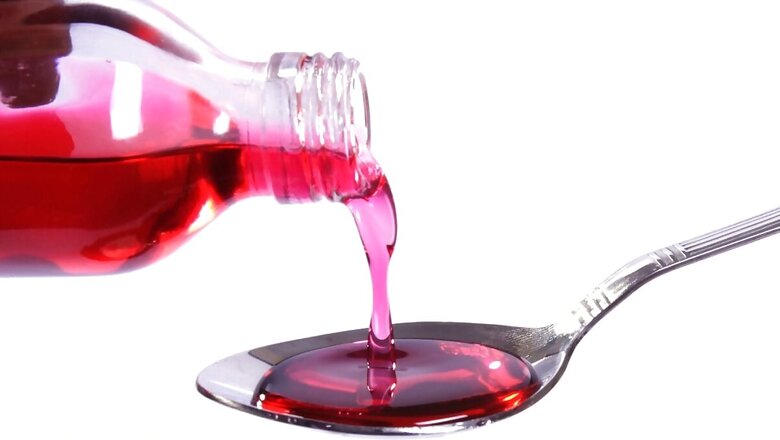
views
Maxtra, T-Minic, Ascoril AF, and other leading brands of cold and flu syrup for children are under the scanner as the drug regulatory agency considers banning their use in the age group under four years.
The apex panel of experts, the Drug Technical Advisory Board (DTAB), has recommended to the Drug Controller General of India (DCGI) to stop the sale of all formulations made using “Chlorpheniramine Maleate IP + Phenylephrine Hydrochloride” for use in children below four years of age.
The combination is used to manufacture several popular brands, including (previously GSK) Haleon’s T-Minic syrup, Zuventus’ Maxtra, Glenmark’s Ascoril Flu Drops, Alembic’s Wikoryl AF, IPCA’s Solvin Cold and many other cold and flu preparations.
Chlorpheniramine maleate and phenylephrine hydrochloride are effective in treating symptoms like watery eyes, runny nose, sneezing, and other discomforts.
Chlorpheniramine maleate is an antihistamine that relieves allergy symptoms, while phenylephrine is a decongestant that works by narrowing small blood vessels to relieve nasal congestion.
News18 has reached out to all drug makers but hasn’t received any comment yet.
Why expert panel has suggested ban for younger kids
According to the minutes of the meeting of DTAB held in August, the panel was apprised that the proposal regarding the use of the fixed-dose combination of chlorpheniramine maleate IP (2 mg) and phenylephrine hydrochloride 1P (5mg) drop per millilitre was deliberated by the subject expert committee (SEC) of pulmonary medicine and after deliberation, SEC recommended that the combination drug should not be used in children below four years of age.
“…accordingly manufacture should mention warning in this regard on label and package insert,” the SEC decided, the minutes said.
However, various drug makers had requested for clarification whether all formulations containing chlorpheniramine and phenylephrine in combinations shall be labelled or this specific strength has to be labelled.
Hence, the matter was re-deliberated before the SEC committee in January along with “specially invited paediatricians.”
“After detailed deliberation, the committee recommended that all formulations of FDC of Chlorpheniramine Maleate IP + Phenylephrine Hydrochloride should not be used in children below 4 years of age and accordingly manufacturers should mention warning “FDC should not be used in children below 4 years of age” on label and package insert/promotional literature of the drug.”
In August, DTAB also deliberated the same matter and agreed with the recommendation of SEC that all formulations of this cocktail combination “should be prohibited for use in children below 4 years of age”.
What do doctors believe?
According to paediatricians and other experts dealing with the medicine of children, restrictions on medicines should be made only if there are other safe, evidence-based treatments for treating cough and cold in young children. They believe that doctors prescribe these combinations ensuring that a child can be given the drug with high chances of benefit when compared to risk.
“Banning is easy but if there is no other option available, doctors may stop prescribing. The medicine may still be used inappropriately or as an off-label alternative,” a paediatrician, requesting anonymity, said.
Dr Maninder Dhaliwal, an expert in paediatric pulmonology at NCR-based Amrita Hospital, believes that “while labelling cough syrups with warnings has definite advantages, the move may confuse parents (as they were already giving the medicine to the child) and they may even distrust doctors”.
He agrees with the government’s move of labelling the potential risk on the packaging but asks for more well-researched and safer options to treat acute cough and cold in young children while prohibiting the present options.
“A visible label ensures that parents, caregivers, and healthcare providers are immediately alerted to the potential dangers, helping to prevent accidental misuse.”
Not only in India, but globally, international authorities have either advised against the use of cough and cold medication or are considering restricting the usage.
An article titled ‘Restricting cough and cold medicines in children’ published in the Journal of Paediatrics and Child Health conducted a systematic review of multiple studies published. It identified 72 relevant studies or clinical reports but found “little support for the effectiveness of these medicines for acute cough or the common cold in children”.
“However, the majority of these medicines do not appear to be highly toxic in children and are not a major cause of severe effects following unintentional poisoning.”
It found that “the common use of these agents does not appear to be responsible for increased deaths in young children. Many cases of toxicity from cough and cold medications in young children are a result of therapeutic error”.
The possible side-effects caused by the drug combination include dizziness, vomiting, restlessness, high blood pressure, abdominal pain, decreased appetite and in rare cases, brain haemorrhage.




















Comments
0 comment